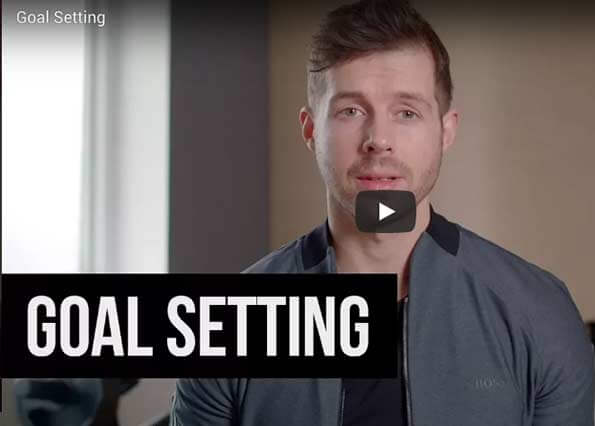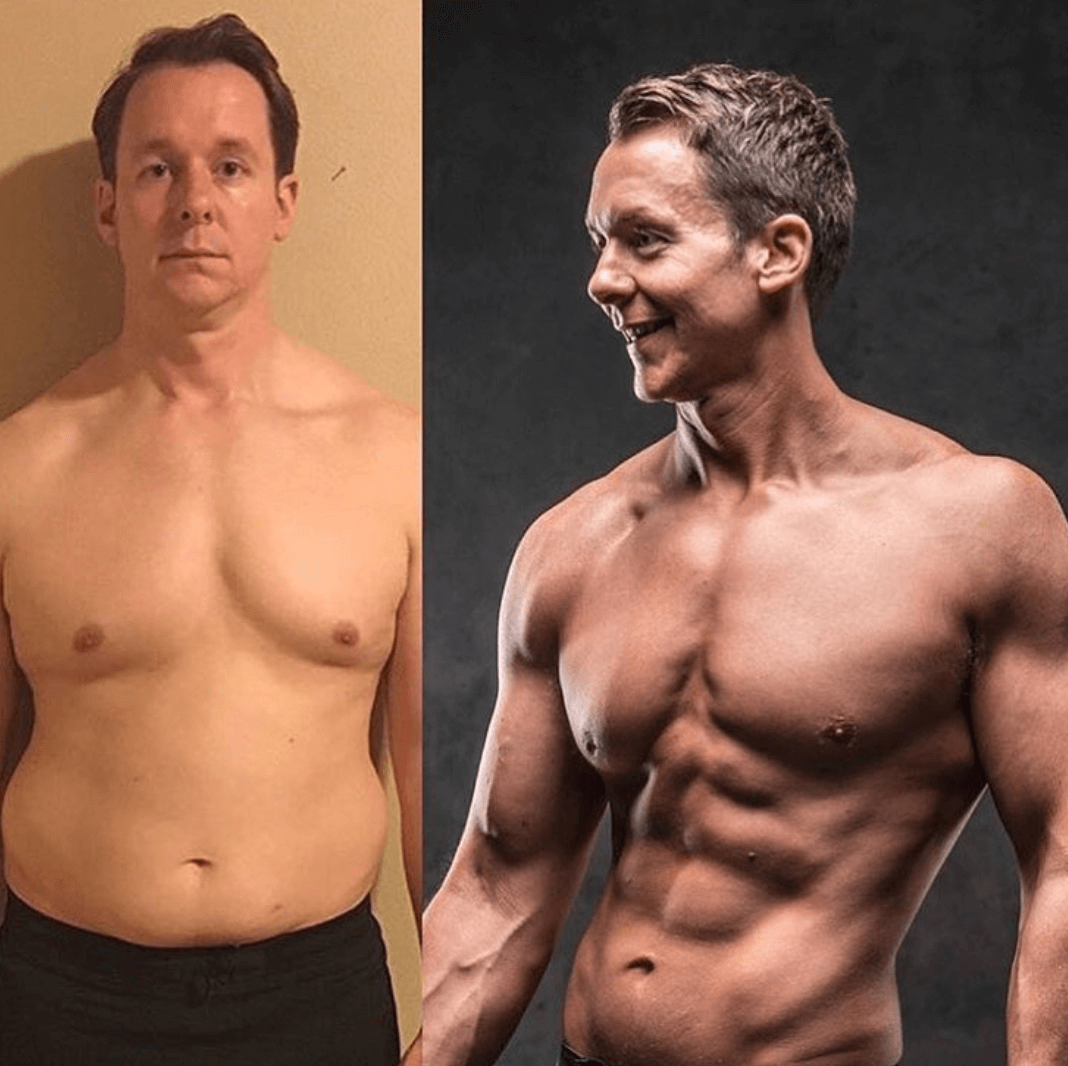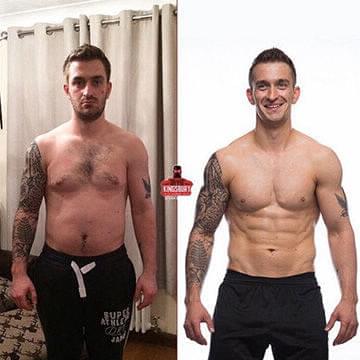Â
Why do we need to set goals?
They give you a clear target.
ItÂ’s progress can be measured and tracked if you know what your focus is.
It makes you less likely to give up early.
It defines what you need to do.
When do we need to set goals?
When we first start training.
Â
Why is this particularly important –
Â
• Choosing your training
• Choosing your calories
• Choosing your macros
• Setting your time frame
 Â
Goal setting is also important – When we have training experience but need a new direction.
It’s important at this stage to ensure you continue to make progress
If you are in a calorie deficit with low body fat and find your muscle mass decreasing it might be time to make a change
Â
If you are building muscle and finding body fat creeping up to an undesirable level then it might be time to drop fat.
Â
But canÂ’t I just drop fat and build muscle at the same time
Â
The answer isnÂ’t clear cut.Â
The answer is possibly.
Â
Body recomposition goals studies show
You can drop body fat and build muscle in a calorie deficit IF =
You are in a slight calorie deficit – go too deep and it won’t happen:
 Â
https://academic.oup.com/ajcn/article/103/3/738/4564609 – 40% calorie deficit causes big muscle loss
https://www.ncbi.nlm.nih.gov/pubmed/17413099 – Average age 61
https://www.ncbi.nlm.nih.gov/pubmed/19997019 – Muscle gain and fat loss while drinking milk!
One study showed the difference between athletes on different weight loss programs. A 19% calorie deficit led to fat loss and muscle gain. 30% deficit led to fat loss but no muscle gain.Â
https://www.ncbi.nlm.nih.gov/pubmed/21558571 – athletes on different weight loss programs. 19% calorie deficit led to fat loss and muscle gain. 30% deficit led to fat loss but no muscle gain.
https://www.ncbi.nlm.nih.gov/pubmed/19927027 – 60% calories, even on high protein participants lost lean body mass, though high protein diet limited muscle loss
So, 30% or 40% reductions in calories result in no muscle gain and even muscle loss.
My suggestion therefore is to not go too deep into a deficit for body composition goals.Â
Â
Whether you are new to training or not can also make big difference.
We have a ‘ceiling effect’ of muscle gain, this means if we have a lot of muscle already it is highly likely that we will not build much muscle in a calorie deficit.
Research shows that inexperienced, experienced and very experienced get different results from training. More experienced requires more effort to elicit a response. Â
https://www.ncbi.nlm.nih.gov/pmc/articles/PMC3879660/ – review paper that refers to the ‘ceiling effectÂ’ – the more you train, the closer you get to your maximum potential
https://www.ncbi.nlm.nih.gov/pubmed/16287373 – this paper shows that inexperienced, experienced and very experienced get different results from training. More experienced requires more effort to elicit a response.
You also are more likely to be able to build muscle and lose fat at the same time if have taken time off training and are getting back into it
There is truth in “muscle memory idea”
Your muscles gain things called myonuclei, which act as memory for your muscles. If you take a long time off training, the myonuclei stick around and make it easier to regain former strength.
https://www.ncbi.nlm.nih.gov/pubmed/26792335 – your muscles gain things called myonuclei, which act as memory for your muscles. If you take a long time off training, the myonuclei stick around and make it easier to regain former strength.Â
If when you start your training you are overweight you will likely be able to add muscle during a fat loss phase, especially if you havenÂ’t donÂ’t much weight training before.Â
https://www.ncbi.nlm.nih.gov/pubmed/10838463 – I found it difficult to find a paper comparing obese to healthy weight, but the papers, such as this one, which study obese people, show fat loss rates are much faster for obese people as they have more fat to lose
https://www.ncbi.nlm.nih.gov/pmc/articles/PMC3738392/ – this also shows weight loss of on average 12kg over 16 weeks for overweight individuals
Â
Lastly, muscle gain and fat loss simultaneously is possible if you are a steroid user
muscles develop larger and stronger with the use of steroids, possibly from the presence of additional satellite cells, which promote muscle growth
 Â
https://www.ncbi.nlm.nih.gov/pubmed/10589853 – muscles devlelop larger and stronger with the use of steroids, possibly from the presence of additional satellite cells, which promote muscle growth
Â
Here I wanted to show two of my online clients and show how the way you plan for progress changes.
Jack hadn’t lifted seriously before, so at the start of the 12 weeks he had the “new” to lifting potential.
You can see he clearly has more muscle mass and less body fat. This was achieved by a slightly calorie reduction for the entire duration.
Daniel on the other hand is very experienced with training and to build muscle requires a calorie surplus and a large one at that due to having a high percentage of muscle mass.
Â
A big problem people face when they start is knowing which way to go.
Should I build muscle?
Should I lose fat?
Do I have the potential to do both?
Â
Understanding your starting position is really important to making good progress in which every direction you choose.
If you are new to training and want to drop fat and build muscle you can for a limited time
How long? The truth is this varies from person to person.
My suggestion is you get everything right, make a start and get progressing. I think you will be surprised at just what you can achieve.
Â
How do you do it?
Aim for a Slight calorie deficit (10-15%)
Maintain High protein intake (I typically work with 35-50% of calories from protein depending on individual factors.
Well planned training (progressive overload etc)
One of the biggest problems people face is they donÂ’t know whether they are in a calorie surplus or deficit.Â
This is fairly fundamental to their goals
In calorie surplus you will not lose fat.
https://www.ncbi.nlm.nih.gov/pubmed/19244669 – The American Dietetic Association (ADA): achieving a negative energy balance is the most important factor affecting amount and rate of weight loss over time
Â
In a calorie deficit your muscle gain will be somewhat limited.
If you have reached the limit of how much muscle you gain in a deficit then training phases are your best option for long term progress.
You can build muscle in a calorie surplus or
Drop body fat in a calorie deficit.
What you need to ensure is that your phases are effective as possible.
 Â
You need to make sure your Muscle maintenance / growth in a calorie deficit is maximised with
Â
Well planned training
Suitable % decrease in calories
High levels of protein
Repeat article from before: https://www.ncbi.nlm.nih.gov/pubmed/19927027 – 60% of maintenance calories, even on high protein participants lost lean body mass, though high protein diet limited muscle loss
https://www.ncbi.nlm.nih.gov/pubmed/22150425 – higher levels of protein required to maintain muscle mass during periods of calorie surplus (about 2g of protein per kg of body mass per day, or around 20-30% calories from protein)
https://www.ncbi.nlm.nih.gov/pubmed/28507015 – maintaining high levels of protein during weight loss maintains muscles
Likewise if you are in a calorie surplus you need to ensure you are building muscle and not just adding fat.
Â
Reasons why you might be gaining too much fat
• Poor training intensity
• Lack of overload and adaptation
• Too many calories
• Poor macro breakdown
Â
So all the guys out there we are almost set to add muscle and drop fat but what about women?
Does all of this apply to women as well as men?
Yea it does. It works the same.
https://www.ncbi.nlm.nih.gov/pubmed/17557987 – the same exercise regime resulted in the same body composition changes in men and women
https://www.ncbi.nlm.nih.gov/pmc/articles/PMC4359685/ – a massive review comparing exercise and calorie interventions for men and women. No significant differences between the two
Â
Your journey
Whilst I donÂ’t know exactly what you are looking to achieve the majority of people I work with want to have
 More muscle and less fat.
 So if that is you then these may well apply to your starting position.
 If you are new to lifting with high levels of fat.
Go for a calorie deficit to bring fat down.
Â
If you train effectively and eat correctly you will achieve some muscle gain along the way
If you are experienced at lifting with high levels of fat
You need to cut and then bulk
You need to train effectively and eat correctly for muscle maintenanceÂ
Give all other possibilities and scenarios
Â
How long should your phases last?
How long is a piece of string
If your phase remains effective then stick with it
ie
if you are building muscle and not too much fat then keep going
If you are hanging onto muscle well and losing fat then stick with it
I would typically suggest longer periods in a calorie surplus than deficit if possible, this will long term lead to more muscle gain
But you do need to be pretty lean at the start for this to effective.
So a lean out for as long it takes to get you there initially is what you should aim for
Â
Hope you found the video useful!










